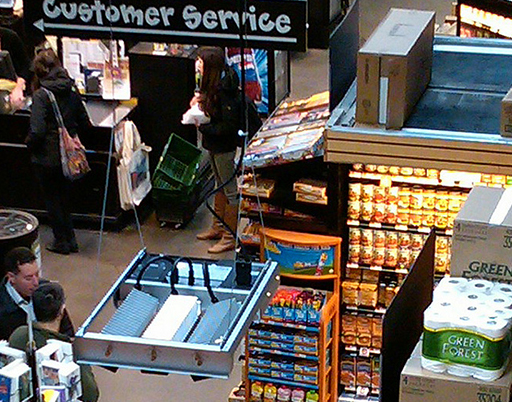Customer: City Market
Location: Burlington, VT
Facility Size: 16,000 ft2
Operational Schedule: 363 days per year, 7 a.m. to 11 p.m.
Environment: Retail Grocery
Installation: Retrofit
Temperature Range: 65º to 75º F (18º to 24º C)
Previous Solution: 400 W Metal Halide
Shifts: 3 shifts x 7 days
Savings per ft2: 100,000 kWh annual (3.5 ¢ light, versus 46 ¢ for a traditional solution)
Reseller: Leading Edge Design Group
Utility Partner: Burlington Electric Department (BED)
Vermont Retailer Enhances Product Presentation and Shelf Life of Perishables While Saving Nearly 100,000 kWh of Energy Per Year
City Market, Onion River Co-op, is a 16,000 square foot community-owned food cooperative located in Burlington, Vermont. Open 363 days of the year, it is the city’s only downtown grocery store, offering a wide range of conventional, organic, and local products to the more than 3,000 customers who pass through its doors each day.
Committed to continuously improving the sustainability of its grocery operations, the City Market management team actively works to find customer-friendly solutions that are both smart choices for the environment and economically sound. So when the team was confronted with the need to replace the store’s aging lighting, which was becoming extremely cost prohibitive to operate and maintain, they turned their attention toward a new generation of ultra-efficient, LED-based solutions.
To aid them in through the evaluation and installation process, the City Market team turned to the Leading Edge Design Group, a nationally recognized provider of LED lighting and wireless lighting control technologies. Following a careful examination of all their options, the team decided to deploy the Intelligent Lighting System from Digital Lumens in the retail areas of its store.

Customer Experience Reigns Supreme
“There is no question that the opportunity to dramatically lower our energy costs and make substantial contributions to our sustainability agenda was an important motivator in our decision to deploy the Digital Lumens system,” said Brent Demers, Facilities Manager for City Market. “But at the end of the day, it was lighting quality that clinched the deal. In a retail grocery environment, delivering a positive customer experience is critical to success, and lighting quality — how you present your products to customers — plays a major role in creating that experience.”
Finding the right solution for customers and employees was a top priority for the facilities team. They needed to find an attractive solution with a high color rendering index and proper color temperature to accentuate produce, meat, prepared foods, and deli offerings, while saving enough energy to ensure the lighting improvements were cost effective — both in the short term and over the long haul. With Digital Lumens, they found this solution and more.
In addition to improved lighting quality, color and aesthetics, the Digital Lumens Intelligent Lighting system provides City Market with:
- Energy saving of approximately 100,000 kWh per year — equal to the removal of more than 64 tons of carbon dioxide from the atmosphere
- An extremely low-maintenance, mercury-free lighting system with a 50,000+ hour lifecycle per luminaire (versus 8,500 for the existing metal halide luminaires)
- Longer shelf life for produce and meat through the elimination of damaging ultra-violet light rays and excessive lamp heat, which causes premature aging and significantly impacts profitability
- A reduced burden on the air conditioning systems, because the Digital Lumens luminaires generate dramatically less heat than legacy lighting systems
- A payback of less than 1½ years
To help replace City Market’s existing metal halide lighting with the dramatically more efficient Intelligent Lighting system, the store’s utility company, Burlington Electric Department, provided an energy efficiency incentive based on the energy savings.
Extraordinary Savings Requires Intelligence
The transition from a metal halide to LED-based lighting system, however, only tells part of the story behind the extraordinary savings City Market has, and is continuing to, accrue. The rest of the story is the Intelligent Lighting System’s integrated intelligence, and LightRules, the software-based lighting management system. LightRules is enabling the City Market team to fine-tune its lighting system based on real usage and performance data, to secure further efficiency gains. Specifically, LightRules provides the management team with:
- Accurate data on energy usage, lighting trends and occupancy patterns, such as kWhs (by luminaire, specified area, or store-wide), usage over time (minute, hour, day, week, etc.), and a wide-range of performance metrics
- The ability to configure lighting behaviors, such as delay settings for dimming or turning lights off when a space is vacated, via easy-to-use, rules-based software controls
- Detailed reports that document the savings for internal purposes and to substantiate rebate incentive claims with Burlington Electric Department, City Market’s utility company
“Not only does the Digital Lumens system use significantly less power to produce remarkably high-quality lighting, but through LightRules we gain the information and tools we need to rack up significant additional savings,” continued Demers. “Given the high cost associated with operating and maintaining the old lighting system, our only regret is that we didn’t do this sooner.”
Success On All Fronts
Installed throughout the store, the new lighting is producing dividends in myriad ways. Customers appreciate the new lighting and the fact that City Market is using significantly less energy to deliver a better quality light, which more closely aligns with many of its customer’s environmental goals and vision of a sustainable business.
For City Market, the new lighting system delivers on three key fronts: its vision of better quality lighting that enhances the shopping experience; its goal to dramatically reduce energy usage with an economically sound investment that makes good business sense; and, to reap significant bottom line savings for its cooperative members.
According to Mr. Demers, “Now THAT is the definition of project success!”

